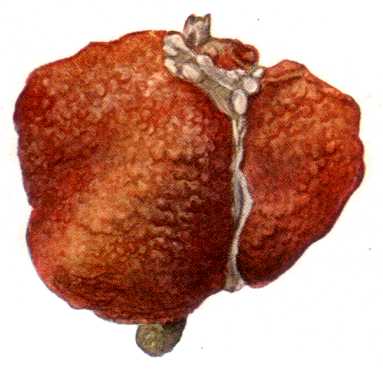Cirrhosis
(Redirected from Chronic liver failure)
| Cirrhosis | |
|---|---|

| |
| Synonyms | N/A |
| Pronounce | N/A |
| Specialty | N/A |
| Symptoms | Fatigue, weakness, jaundice, itching, fluid accumulation in the abdomen, confusion, bleeding |
| Complications | Portal hypertension, liver failure, hepatocellular carcinoma |
| Onset | Gradual |
| Duration | Chronic |
| Types | N/A |
| Causes | Alcohol abuse, hepatitis B, hepatitis C, non-alcoholic fatty liver disease, autoimmune hepatitis, primary biliary cholangitis, primary sclerosing cholangitis, Wilson's disease |
| Risks | N/A |
| Diagnosis | Liver biopsy, blood tests, imaging studies |
| Differential diagnosis | N/A |
| Prevention | Vaccination, reducing alcohol consumption, maintaining a healthy weight, managing underlying conditions |
| Treatment | Treating underlying causes, medications, liver transplant |
| Medication | N/A |
| Prognosis | N/A |
| Frequency | N/A |
| Deaths | N/A |
Cirrhosis is a chronic liver disease characterized by the formation of scar tissue (fibrosis) and the loss of liver function. Cirrhosis can lead to severe complications, including portal hypertension, liver failure, and hepatocellular carcinoma (liver cancer).
Causes[edit | edit source]
Cirrhosis can result from various factors, including:
- Alcohol abuse
- Chronic viral infections, such as hepatitis B and hepatitis C
- Non-alcoholic fatty liver disease (NAFLD) and non-alcoholic steatohepatitis (NASH)
- Autoimmune hepatitis
- Primary biliary cholangitis (PBC)
- Primary sclerosing cholangitis (PSC)
- Genetic disorders, such as Wilson's disease and hemochromatosis
Symptoms[edit | edit source]
Cirrhosis may initially present without symptoms. As the disease progresses, symptoms may include:
- Fatigue and weakness
- Loss of appetite and weight loss
- Jaundice (yellowing of the skin and eyes)
- Itching (pruritus)
- Fluid accumulation in the abdomen (ascites)
- Swelling in the legs (edema)
- Confusion, drowsiness, and slurred speech (hepatic encephalopathy)
- Gastrointestinal bleeding
Diagnosis[edit | edit source]
Cirrhosis can be diagnosed using a combination of methods, such as:
- Blood tests to assess liver function and rule out other causes
- Imaging studies, such as ultrasound, CT scan, or MRI
- Liver biopsy, where a small sample of liver tissue is removed and examined under a microscope
Prevention[edit | edit source]
Preventive measures for cirrhosis include:
- Vaccination against hepatitis B
- Practicing safe sex and avoiding exposure to infected blood to prevent hepatitis B and C
- Reducing alcohol consumption or abstaining from alcohol
- Maintaining a healthy weight and managing conditions like diabetes and high cholesterol
- Early detection and treatment of autoimmune liver diseases
Treatment[edit | edit source]
Treatment for cirrhosis focuses on addressing the underlying cause and managing complications. This may include:
- Stopping alcohol consumption
- Antiviral medications for hepatitis B or C
- Weight loss and lifestyle modifications for non-alcoholic fatty liver disease
- Medications to manage autoimmune hepatitis, primary biliary cholangitis, or primary sclerosing cholangitis
- Liver transplant in severe cases
References[edit | edit source]
External links[edit | edit source]
- National Institute of Diabetes and Digestive and Kidney Diseases - Cirrhosis: [4]
- American Liver Foundation - Cirrhosis: [5]
- Mayo Clinic - Cirrhosis: [6]
| This article is a medical stub. You can help WikiMD by expanding it! | |
|---|---|
Lua error in package.lua at line 80: module 'strict' not found.
| Health science - Medicine - Gastroenterology - edit |
|---|
| Diseases of the esophagus - stomach |
| Halitosis | Nausea | Vomiting | GERD | Achalasia | Esophageal cancer | Esophageal varices | Peptic ulcer | Abdominal pain | Stomach cancer | Functional dyspepsia | Gastroparesis |
| Diseases of the liver - pancreas - gallbladder - biliary tree |
| Hepatitis | Cirrhosis | NASH | PBC | PSC | Budd-Chiari | Hepatocellular carcinoma | Acute pancreatitis | Chronic pancreatitis | Pancreatic cancer | Gallstones | Cholecystitis |
| Diseases of the small intestine |
| Peptic ulcer | Intussusception | Malabsorption (e.g. Coeliac, lactose intolerance, fructose malabsorption, Whipple's) | Lymphoma |
| Diseases of the colon |
| Diarrhea | Appendicitis | Diverticulitis | Diverticulosis | IBD (Crohn's, Ulcerative colitis) | IBS | Constipation | Colorectal cancer | Hirschsprung's | Pseudomembranous colitis |
| Organ failure | ||||
|---|---|---|---|---|
|
Search WikiMD
Ad.Tired of being Overweight? Try W8MD's physician weight loss program.
Semaglutide (Ozempic / Wegovy and Tirzepatide (Mounjaro / Zepbound) available.
Advertise on WikiMD
|
WikiMD's Wellness Encyclopedia |
| Let Food Be Thy Medicine Medicine Thy Food - Hippocrates |
Translate this page: - East Asian
中文,
日本,
한국어,
South Asian
हिन्दी,
தமிழ்,
తెలుగు,
Urdu,
ಕನ್ನಡ,
Southeast Asian
Indonesian,
Vietnamese,
Thai,
မြန်မာဘာသာ,
বাংলা
European
español,
Deutsch,
français,
Greek,
português do Brasil,
polski,
română,
русский,
Nederlands,
norsk,
svenska,
suomi,
Italian
Middle Eastern & African
عربى,
Turkish,
Persian,
Hebrew,
Afrikaans,
isiZulu,
Kiswahili,
Other
Bulgarian,
Hungarian,
Czech,
Swedish,
മലയാളം,
मराठी,
ਪੰਜਾਬੀ,
ગુજરાતી,
Portuguese,
Ukrainian
Medical Disclaimer: WikiMD is not a substitute for professional medical advice. The information on WikiMD is provided as an information resource only, may be incorrect, outdated or misleading, and is not to be used or relied on for any diagnostic or treatment purposes. Please consult your health care provider before making any healthcare decisions or for guidance about a specific medical condition. WikiMD expressly disclaims responsibility, and shall have no liability, for any damages, loss, injury, or liability whatsoever suffered as a result of your reliance on the information contained in this site. By visiting this site you agree to the foregoing terms and conditions, which may from time to time be changed or supplemented by WikiMD. If you do not agree to the foregoing terms and conditions, you should not enter or use this site. See full disclaimer.
Credits:Most images are courtesy of Wikimedia commons, and templates, categories Wikipedia, licensed under CC BY SA or similar.
Contributors: Prab R. Tumpati, MD




